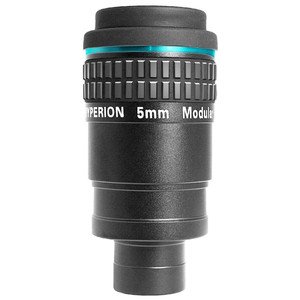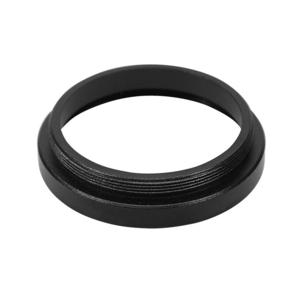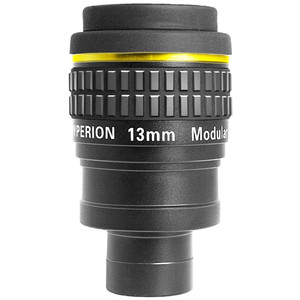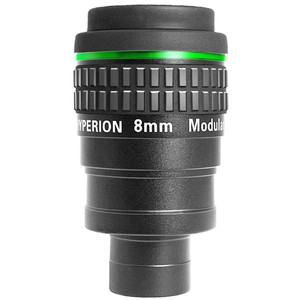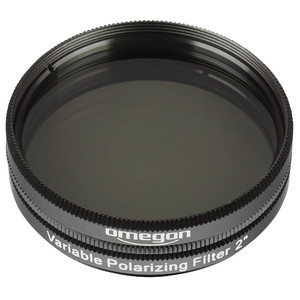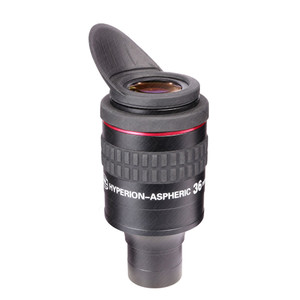More about the series Hyperion...
Aspherical eyepieces: Rays near the edge of the frame are normally refracted more towards the middle than light rays closer to the axes. This means the image field on an uncorrected system becomes blurry at the edges. Aspherical correction on an optical system removes multiple imaging errors in one go. Clarity is achieved across the entire image, distortion is kept to a minimum and the eyepiece can be made considerably smaller and lighter weight.
As has become standard in the latest camera lenses, the eyepiece is constructed using aspherical lens surfaces in order to achieve the best image performance across the entire image field in the smallest of spaces. The aspherical eyepiece construction means is designed with fewer layers of glass and, together with the extremely high-quality Phantom Group multi-coating, an aspherical eyepiece delivers a bright, high-contrast image to rival doubly expensive wide-angle lenses with spherical lenses.
- At 72°, the aspherical apparent field of view is only marginally larger than the largest image field achieved by the human eye of 68°. This means that the entire star field can be viewed simultaneously, without having to move your eyes. Many wide-angle eyepieces advertise an impressive visual field of 80° or above. This cannot be viewed all at once and the available light is spread over an image surface which is too large so that image brightness and contrast suffer.
- Extremely wide-angled eyepieces, and also wide-angle eyepieces with simple lens constructions, often result in eye strain. Even moving your eye gently from side-to-side, makes the image disappear instantly. An eyepiece like this is especially frustrating when working with students, guests or in a public observatory. Aspherical eyepieces stand out in this respect thanks to their especially helpful eye relief. Even inexperienced observers are effortlessly guided towards optimum viewing position and, on a mobile telescope where the lens tube vibrates during focusing, effective eye relief is more valuable than even the largest visual field.
- Photographic adapter thread for all types of projection photography: All current DSLR camera bodies with or without lenses, as well as CCD cameras, can be directly attached using the M43 thread on the same side as the eye or the SP 54 thread. There is also a large selection of adapter threads and transition rings available. These enable the focus distance to be adjusted to almost any size when small star fields or planetary objects need to be documented with high resolution. Every eyepiece comes with precise instructions.
- Suitability for projection photography: Every aspherical eyepiece is fitted with screw threads on each side so that it can be integrated into an optical light beam to form a projection system. A 2” SC thread is located on the side of the telescope which enables the eyepiece to be securely fastened to the backside of the lens tube on all Schmidt Cassegrain scopes without requiring a separate receptacle or a zenith mirror. This extremely short mounting method provides a larger true visual field than wide-angle eyepieces with 2” holders.
The eyepiece comes with a 1 1/4” and a 2” receptacle.
The advantages in a nutshell:
- high quality workmanship
- relaxed viewing
- large field of view
- perfect sharpness
- excellent colour fidelity
- dual use with 1.25" and 2" barrels
- low distortion
- low astigmatism
- no 'kidney bean' effect
Baader Phantom Group coating™ - this is a 7-layer broadband anti-reflection coating with extremely low residual reflection. The designation 'Group' indicates that the most effective anti-reflection layer system is worked out for each type of glass used in the respective eyepiece.
All these various antireflection coatings, on each type of glass surface, have then been optimized so that they are most effective where the human eye is at its most sensitive at night - i.e. at about 520nm, which is in the green region of the spectrum.
The best anti-reflection coatings appear almost colourless - this proves that the coating is functioning equally well over the entire visible spectrum. Phantom Group antireflection coatings are - depending on the type of glass - almost entirely colourless. In this way it is ensured that the least light is lost to the night-adapted eye and that no scattered light will interfere.
If you look directly at a coated lens (eyepiece or objective) and can see a strong green reflection, then it is not a Baader Phantom Group coating! An intense green reflection is indicative of a relatively low-tech coating technology and means that light is being wastefully reflected - i.e. lost - right in the useful spectral range between 500-550nm.
Our expert comment:
We have tested the eyepieces with an f5 Newtonian telescope and can confirm their excellent edge correction. Compared to cheaper 70 degree eyepieces, the aspheric Hyperion eyepieces give a significant improvement in field correction! Despite the 1.25-inch eyepiece adapter supplied, the eyepieces can only be effectively used with a 2 inch focuser.
(Bernd Gährken)
Tip: You can find all important information at a glance in our infographic, Your telescope needs these three eyepieces! You can find a comprehensive overview in our buyers guide The big buyers guide: The best eyepiece for every telescope

